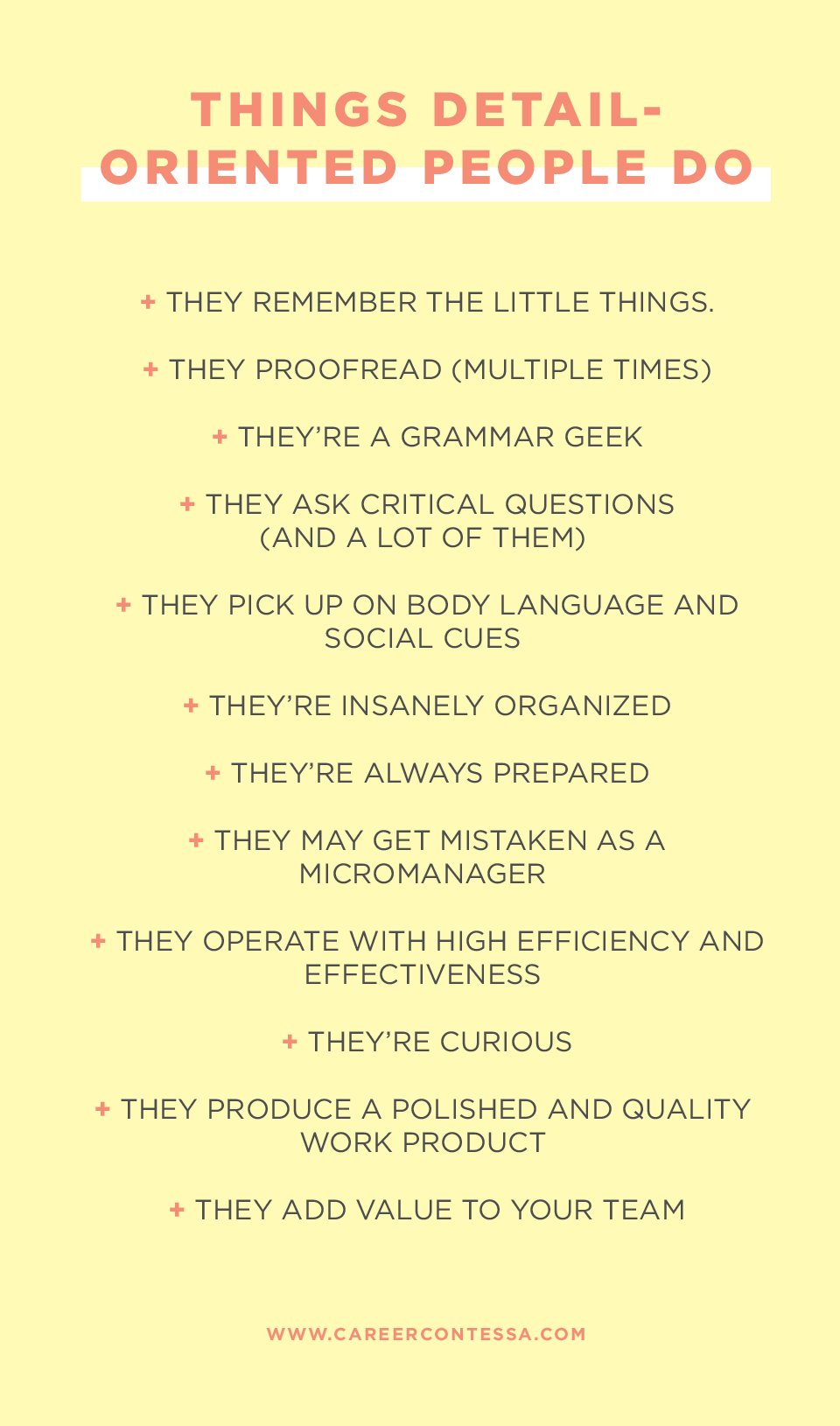Detail-oriented: a skill you’ve likely used to describe yourself on your resume or in a job interview at one point or another.
While it’s a commendable attribute to add to your arsenal of skills, what does it actually mean? Furthermore, should you describe yourself as detail-oriented when...that might not be the case?
While one spelling error does not define you, it can be the difference between your resume heading into the "yes" pile and the "no" pile. In this article, we're exploring what it means to be detail-oriented, what attention to detail actually looks like, and the types of people who could work to be more precise.
Table of Contents
It's all in the details. Let's dive in.
What Does It Really Mean to be Detail-Oriented?
A detail-oriented person exercises extreme attention to detail. They’re thorough, accurate, organized, and productive. They seek to understand both the
cause and effect of a situation.
Detail-oriented people focus on the details and pay extra close attention to the little things, but that sounds a bit high-level to be a quality an employer can’t live without, right?
10 Behaviors of Detail-Oriented Employees
Want to become detail-oriented? It's not going to happen overnight, but practicing the habits of those with a high attention to detail can help build your own.
Here are ten behaviors to study and mimic to become better at all the details that make the difference.
1. They Remember the Little Things
Details. Details. Details.
They
actually remember people’s names after being introduced, and they don’t forget birthdays, let alone deadlines (no matter how big or small). Coworkers and friends can count on them to be the group’s documentarian.
Use tips like taking thorough notes in meetings (handwritten or digital), setting reminders on your phone, and adding important dates and information to your calendar to guarantee you don’t forget.
Being detail-oriented can also have its downfalls if you tend to get lost or overwhelmed by too many details. Understand if this is an issue for you, and make conscious efforts to pick your head up every so often so as to not get completely sucked into the minutiae. Again,
knowing how you work can mitigate this setback and help you keep the big picture in mind.
2. They Proofread (Multiple Times)
It’s common practice to proofread your work before you
turn it over to your boss or even an email before you send it to a friend. But proofreading isn’t a one-and-done kind of deal for those that are detail-oriented.
For them, completing their work, putting it down, and returning to it a few minutes to a few days later is common practice. Then, they reread it and check it for typos and grammatical errors, put it down, check it for context and completion, and repeat. They may do this again and again until they arrive at a product they feel good about.
Proofreading multiple times ensures you’re representing your best self
before you hit send on that email and that you’ve put your best work forward before your big presentation. It can also help avoid embarrassing mishaps down the road.
3. They’re a Grammar Geek
They cringe when someone misuses "their," "there," and "they’re." They might even identify as Oxford comma enthusiasts. Just because something sounds acceptable doesn’t mean it’s grammatically correct.
Detail-oriented people take the time to ensure everything they write adheres to proper structure and syntax. They always want to put their best foot forward. This goes hand-in-hand with proofreading.
Real-Life Example of Detailed Grammar Check
How I Edit My Writing for Details in Three Steps from our Content Director, Caileen Kehayas Holden Step One: Once I finish, I make sure to save my work and exit the screen. This gives me space to detach from the work I just finished.
Step Two: I busy myself with smaller tasks or other assignments. Sometimes, I use this time for a walk or a break to completely clear my mind.
Step Three: After at least an hour, I review my writing (with Grammarly!) I find that I am much more likely to find very obvious mistakes if I take a break from the body of work.
4. They Ask Critical Questions (And a Lot of Them)
Asking questions ensures they fully understand whatever it is they’re doing. They don’t go into projects blindly or assume anything.
They ask probing questions to gain a complete understanding of what it is they’re trying to accomplish, why they’re working towards that goal, and everything else in between.
Having an analytical mind ensures that they don’t let any details slip through the cracks.
Some may mistake their numerous, detailed questions as a trait of a perfectionist, which can be the case, but not always. Accuracy can be misinterpreted as perfection. If you’re detail-oriented, don’t let the fear of
appearing as a perfectionist keep you from doing quality work.
5. They Pick Up on Body Language and Social Cues
The details don’t always lie in physical work products. They’re also found in the way we speak and carry ourselves. This means that by paying attention to someone’s stance, tone of voice, or emotions, you can
pick up on major cues about how you should interact with them.
If someone appears stressed and is short with you, it’s likely not the best day to talk about that promotion you are hoping to snag.
Detail-oriented people are insanely observant and can sense the moods of those around them by acknowledging their body language, and those cues become even stronger once they speak. Knowing when and what to say at the right times and when to be empathetic is to your benefit.
6. They’re Insanely Organized
It's actually a little annoying, isn't it?
They live by their planner or their Google calendar. Their to-do list is likely color-coded, and their bookshelf is alphabetized. A key detail-oriented skill is organization. Establishing a
fool-proof system that works is essential to high-efficiency work and personal life.
Strong organization sets a great example for your team at work and shows that you mean business. Keeping things in order ensures
less stress, a greater sense of control, and sets you up for success.
7. They’re Always Prepared
Planning is the name of the game—and they play to win. They come to meetings prepared, they plan ahead for projects, and they establish reasonable timelines. Detail-oriented people understand that planning sets themselves and their team up for success.
Identifying potential roadblocks, doing the necessary research, and establishing a strategy before diving into a task or project helps to eliminate issues on the backend and ensure a smoother overall process.
8. They May Get Mistaken as a Micromanager
Others may understand their crazy attention to detail, but they may not like it when that hyper-focus falls on them.
If you’re a manager or a team leader who habitually points out little details and flaws in other people’s work, they may be taken aback by your “pickiness” and accuse you of being a micromanager.
Micromanagers want to be cc’ed on every email, ask for constant updates, and may never seem happy with the final product. You can combat micromanager accusations by explaining your "why" to coworkers. If you’re asking for a tenth revision on that report, explain why its accuracy is so important.
Maybe it’s going in front of the CEO or the board of directors, and any mistakes would reflect poorly on you and your team. If you’re making requests that may come off as micromanaging, explaining your intent will help others see through your eyes. It’s up to you to trust that they’re skilled enough to do the job.
9. They Operate With High Efficiency and Effectiveness
High efficiency leads to
maximum productivity, while high effectiveness means you’re getting the job done right. Combine them both and you’ve found a recipe for success. A key detail-oriented skill is time management. You're starting at a loss without the ability to manage your time efficiently.
This often means planning and preparing so
you can dive into a task head-on and fully prepared. It also means that while you’re working on a task, you’re limiting distractions. Yes, we’re talking about your phone. Turning off notifications or hitting airplane mode for a period of time can help you laser-focus.
When you’re managing your time efficiently, by delegating work, cutting out unnecessary steps, setting goals, and
saying “no” when it makes sense, you’re likely to increase your effectiveness. Effectiveness ensures you’re adding valuing and accomplishing the task at hand.
Getting the job done right should be your number one priority, but detail-oriented people also know that time is money. Finding a healthy balance between efficiency and effectiveness is essential to operate at your maximum potential.
10. They’re Curious
Curiosity may have killed the cat, but it keeps the detail-oriented person learning every day.
Being inquisitive has its perks when it provides them with valuable information they wouldn’t have discovered otherwise. Genuine curiosity is the key to knowledge-gathering.
The more you know, the better your view of the world will be. This adds valuable perspective to everything you do. So, don’t be afraid to
ask questions and inspect the people and places you encounter daily and beyond. Your curious nature allows you to gather information and solve your problems.
11. They Produce a Polished + Quality Work Product
It’s no surprise that detail-oriented people have high standards.
It’s because they know the work they create is a direct reflection of their brand. When you consistently produce a great product, people learn that they can rely on you to get the job done, and, more importantly, get it done well.
Not giving your stamp of approval until everything is exactly as it should be means you’re delivering a product you can feel good about.
12. They Add Value to Your Team
Being detail-oriented means little if you’re not adding value. Their team is likely in awe of their commitment to detail and consistent way of getting the job done. It’s second nature for them to be a team player.
Whether they’re contributing with detailed reports, thought-out plans, or comprehensive notes, you know you can count on them to bring something to the table.












